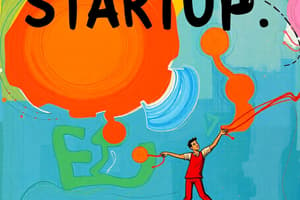Podcast
Questions and Answers
Which of the following is a reason why startups fail? (Select all that apply)
Which of the following is a reason why startups fail? (Select all that apply)
- Weak Management Team (correct)
- Strong Competition (correct)
- Lack of Market Need (correct)
- High Profitability
Technical capabilities do not play a significant role in startup success.
Technical capabilities do not play a significant role in startup success.
False (B)
Process innovation involves creating or improving methods and ______ within an organization.
Process innovation involves creating or improving methods and ______ within an organization.
systems
What is the waterfall model?
What is the waterfall model?
What does the agile process emphasize?
What does the agile process emphasize?
What is a Minimum Viable Product (MVP)?
What is a Minimum Viable Product (MVP)?
Customer needs intersect with technical capabilities to create ______.
Customer needs intersect with technical capabilities to create ______.
What is the primary purpose of product innovation?
What is the primary purpose of product innovation?
What are the key characteristics of agile methodologies?
What are the key characteristics of agile methodologies?
Match the following types of innovation with their descriptions:
Match the following types of innovation with their descriptions:
Flashcards are hidden until you start studying
Study Notes
Reasons for Startup Failures
- Lack of Market Need: Products/services fail to solve real problems or fulfill significant needs.
- Poor Business Model: Inefficient revenue strategies or unsustainable operations hinder success.
- Insufficient Capital: Running out of funds before reaching profitability is a common risk.
- Weak Management Team: Inexperienced leadership can lead to poor decision-making.
- Competitive Pressures: Intense competition can overshadow startup offerings.
- Product Issues: Quality problems, delays, or failure to meet user expectations undermine trust.
- Marketing Problems: Ineffective marketing can cause low customer acquisition rates.
Technical Capabilities
- Technical Skills: Proficiency required in programming, data analysis, system design, and troubleshooting.
- Knowledge: Awareness of relevant technologies, methodologies, and industry best practices is essential.
- Tools and Resources: Access to necessary software, hardware, and other technical tools is critical.
- Innovation and Adaptability: Ability to learn new technologies and adjust to technical changes enhances competitiveness.
- Problem-Solving: Skills to identify and address issues effectively are vital for progress.
Customer Needs
- Functional Needs: Products must serve practical purposes, like reliability in transport.
- Emotional Needs: Offer experiences that evoke feelings, e.g., prestige from luxury brands.
- Social Needs: Meet desires for acceptance or status, such as eco-friendly products.
- Convenience Needs: Ensure ease of access and use, such as user-friendly mobile applications.
- Financial Needs: Address cost concerns and perceived value to enhance affordability.
Intersection of Customer Needs and Technical Capabilities
- Value is realized only when customer needs align with technical capabilities, emphasizing the importance of intersection.
Types of Innovation
- Process Innovation: Enhances efficiency, quality, or customer satisfaction through method improvements.
- Product Innovation: Involves creating/improving goods/services to meet market demands or customer needs.
- Service Innovation: Develops new/improved services or processes to elevate customer experiences and distinguish from competitors.
Development Methodologies
- Waterfall Process: A linear approach to software development with distinct sequential phases (conception to maintenance).
- Agile Process: A flexible, iterative project management method that emphasizes collaboration, adaptability, and continuous improvement.
Agile Process Characteristics
- Build: Create a Minimum Viable Product (MVP) to test key hypotheses via a simplified version of the offering.
- Learn: Analyze user data and insights to assess validity of assumptions and strategies.
- Measure: Collect metrics and feedback from real user interactions to inform decision-making on whether to pivot or persevere.
Studying That Suits You
Use AI to generate personalized quizzes and flashcards to suit your learning preferences.




